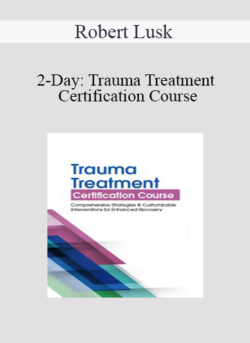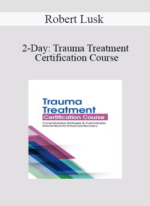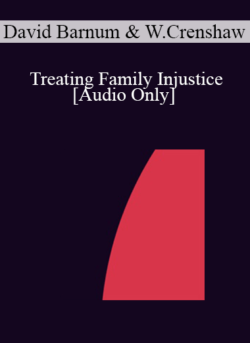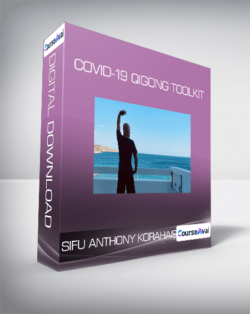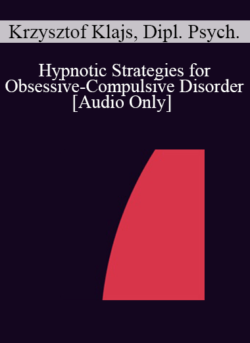[Instant Download] – Immediately deliver the download link after receiving the paymentPurchase Robert Lusk – 2-Day: Trauma Treatment Certification Course: Comprehensive Strategies and Customizable Interventions for Enhanced Recovery courses at here with PRICE $439.99 $83Faculty:Robert LuskDuration:12 Hours 26 MinutesFormat:Audio and VideoCopyright:Jan 21, 2019www.evergreencertifications.com/CCTP to get started!Handouts Manual – 2-Day: Trauma Treatment Certification Course: Comprehensive Strategies and Customizable Interventions for Enhanced Recovery (3.8 MB) 55 Pages Available after Purchase Outline Trauma Impact: Summary of the Research Definitions & conceptsShort term and long term effects (the ACE study)The “good” and “bad” news about trauma exposureLimitations of the researchAssessment and Diagnosis of Trauma Assessment of trauma in children, adolescents and adultsTrauma-& Stressor-Related Disorders in the DSM-5What’s still missing from the DSM-5®?Common pitfalls in diagnosisMy “favorite” diagnosis & why to use it frequentlyAddress Trauma’s Impact on NeurobiologyMajor areas of impactThe 3-part brain (or upstairs/downstairs brain)Neurologically-related issues in trauma survivors”Arrested Development””Hair Trigger” threat responseCognitive, academic, & work-related problemsRelationship problemsThe arousal continuumDissociationEvidence-based Treatments vs. the “Real World” What does “evidence-based” mean in trauma treatment?Components of evidence-based treatmentsThe evidence-based components approachPoints of Intervention in Trauma TreatmentMain entry points: immediate support vs. trauma treatmentPsychological first aidStages of trauma-focused treatmentWhat can you do if your client isn’t emotionally or physically safe?Trauma-Focused Cognitive-Behavioral Therapy: The “Gold Standard”Case examples”Amanda”: 7-year-old girl with sexual abuse and complex family issues”Phil”: mid-30s man whose son died while in his careAddress Critical Domains in Trauma TreatmentThe Physiology DomainSleepNutrition and hydrationSensory needs and interventionsMedications, supplements, & nontraditional interventionsPhysical activity/exercise”Amanda” and “Phil” and the physiology domainThe Relationship DomainThe Attachment, Regulation, & Competency (ARC) model (for youth)Teaching caregiver emotional control (for caregivers of youth)Build attunement (for caregivers of youth)Positive discipline (for caregivers of youth)Build the therapeutic allianceBuild a support networkImplement routines & rituals”Amanda” and the relationship/attachment domain”Phil” and the relationship domainThe Emotional Regulation DomainFeelings identification and expressionUse SUDs scalesGrounding & self-soothing techniquesThe “Comfort Kit”Add attunement!Apply Bruce Perry’s Neurosequential Model of Therapeutics™NMT assessmentsNMT: Interventions by developing age”Amanda” and “Phil” and the emotional regulation domainThe Cognitive DomainTeach and practice problem-solvingTeach and practice mindfulnessAddress distorted cognitions: Most common targets of cognitive processingCognitive processing: how to modify problematic thoughtsUse the Franklin Method”Amanda” and “Phil” and the Cognitive DomainThe Identity DomainFocus on identity and sense of selfBuild on existing strengthsThe Life Book approachExercises to improve identity”Amanda” and “Phil” and the identity domainAdditional Components for the 3 Stages of Trauma RecoveryStage One: Safety & StabilizationEstablish rapportEducation of the client about effect of traumaSafety plansTrauma-specific areas of focusSexual abuse for “Amanda”Triggers for “Phil”Stage Two: Process the Past TraumaPreparationCreate the trauma narrativePlay and verbal-based methods of creating the trauma narrativeProcess of constructing a trauma narrativeWhen is your client finished with Stage Two?Process “Amanda’s” trauma (play therapy “narrative”Process “Phil’s” trauma (verbal narrative)Stage Three: Reconnection:Consolidate/internalize coping skillsEnhance positive emotionsMaking meaning of the traumaFacilitate reconnection to daily activitiesEnhance current relationshipsPrepare for future safety and triggersPosttraumatic growthReconnection for “Amanda” and “Phil”Resiliency and Protective FactorsResearch on resiliency and protective factorsThe top protective factors for traumaBuild resiliencyFacultyRobert Lusk, PhD Related seminars and products: 2 Robert Lusk, PhD, has devoted his career to working with trauma survivors and their families, and providing training and consultation to parents, military families, and professionals on trauma-related issues, parenting special needs children, attachment disorders, psychotropic medications, reintegration after deployment, and psychiatric disorders. For the past 26 years, Dr. Lusk has served as clinical director at The Baby Fold. There, he designs and implements new programs, and provides clinical supervision, consultation and oversight to all the agency’s treatment programs.Dr. Lusk completed a full-time internship at the Brentwood Veterans Administration Medical Center in Los Angeles, where he focused on PTSD treatment for combat veterans. He has continued to provide supervision, training, and treatment for veterans and other adult trauma survivors for the past 30 years.Dr. Lusk also instructs courses at Illinois Wesleyan University and has been actively involved in investigative research on trauma for over 30 years, including studies of treatment approach efficacy and cognitive and school-related effects of trauma. He has published several journal articles and book chapters on understanding and treating trauma.Dr. Lusk earned his Master’s and Doctoral degrees in clinical psychology from the University of California at Los Angeles and has trained in a variety of interventions including Trauma-Focused Cognitive Behavioral Therapy, the Attachment, Regulation, and Competency (ARC) model, Collaborative Problem-Solving, couples and family therapy, Trust-Based Relational Intervention, and Eye Movement Desensitization and Reprocessing (EMDR).Speaker Disclosures:Financial: Robert Lusk is an adjunct assistant professor at Illinois Wesleyan University. He has an employment relationship with The Baby Fold. Dr. Lusk receives a speaking honorarium from PESI, Inc.Non-financial: Robert Lusk has no relevant non-financial relationship to disclose. Salepage: https://catalog.pesi.com//item/2day-trauma-treatment-certification-comprehensive-strategies-customizable-interventions-enhanced-recovery-54210Archive: https://archive.ph/wip/77YAcPurchase Robert Lusk – 2-Day: Trauma Treatment Certification Course: Comprehensive Strategies and Customizable Interventions for Enhanced Recovery courses at here with PRICE $439.99 $83
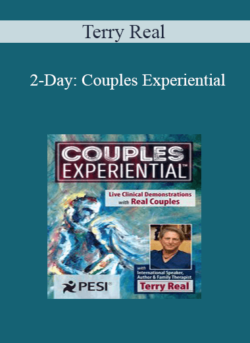 Terry Real – 2-Day: Couples Experiential: Live Clinical Demonstrations with Real Couples featuring Terry Real
₹13,778.00
Terry Real – 2-Day: Couples Experiential: Live Clinical Demonstrations with Real Couples featuring Terry Real
₹13,778.00
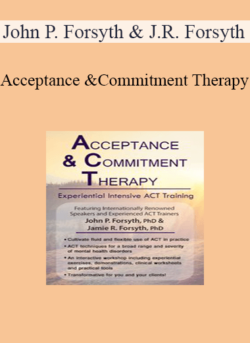 John P. Forsyth, Jamie R. Forsyth – Acceptance and Commitment Therapy: Experiential Intensive ACT Training
₹13,778.00
John P. Forsyth, Jamie R. Forsyth – Acceptance and Commitment Therapy: Experiential Intensive ACT Training
₹13,778.00
Robert Lusk – 2-Day: Trauma Treatment Certification Course: Comprehensive Strategies and Customizable Interventions for Enhanced Recovery
₹13,778.00

